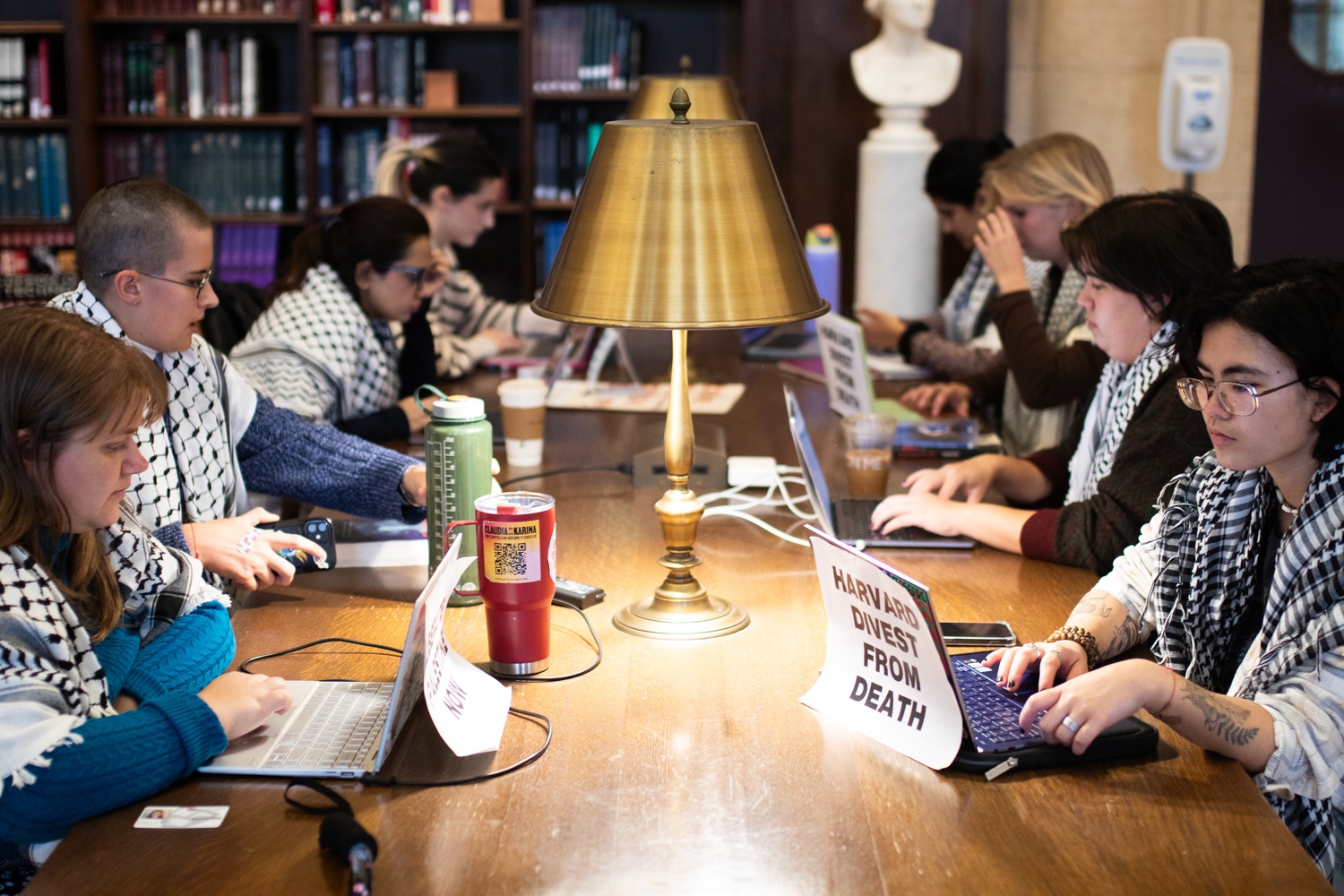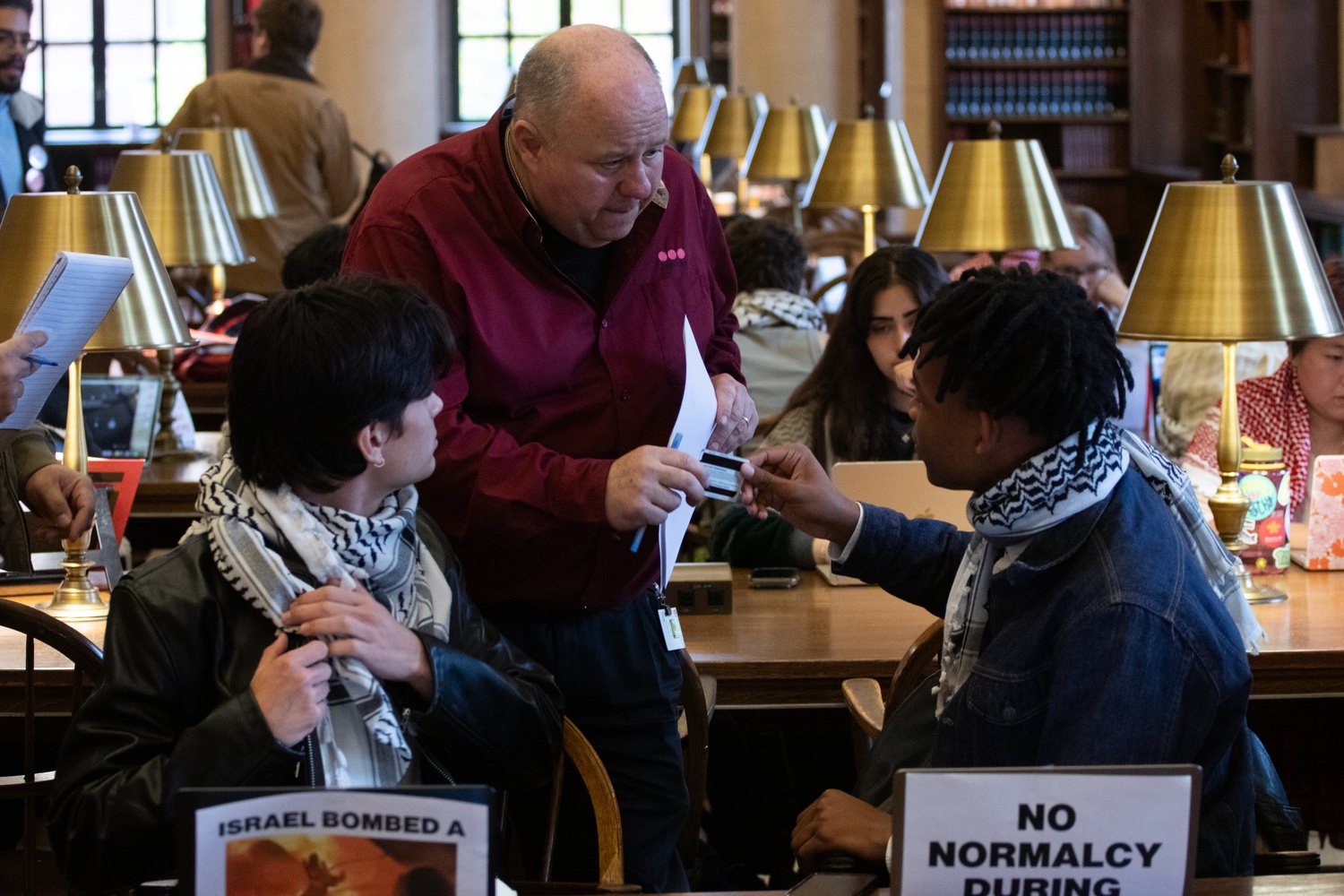
News
Harvard Grad Union Agrees To Bargain Without Ground Rules

News
Harvard Chabad Petitions to Change City Zoning Laws

News
Kestenbaum Files Opposition to Harvard’s Request for Documents

News
Harvard Agrees to a 1-Year $6 Million PILOT Agreement With the City of Cambridge

News
HUA Election Will Feature No Referenda or Survey Questions
More Than 70 Harvard Students Stage Pro-Palestine Study-In at Widener Library

More than 70 pro-Palestine activists staged a silent study-in at Widener Library on Tuesday to protest the University’s refusal to conduct a review of its investments for ties to human rights violations.
The study-in, which lasted for three-and-a-half hours in Widener’s Loker Reading Room, came one day after Harvard Out of Occupied Palestine announced that University President Alan M. Garber ’76 had rejected their proposal for conducting a review of the University’s endowment.
HOOP wrote in an Instagram post on Monday that Garber’s decision would result in a “week of action” from pro-Palestine groups on campus.
During the study-in, organizers taped signs labeled “Free Palestine,” “You Cannot Suspend My Solidarity,” “Israel is Burning People Alive,” and “Harvard Divest from Death” to their laptops and quietly read and studied. Some protesters also read copies of the Harvard Crimeson and the New York War Crimes, two pro-Palestine publications modeled after established newspapers.
The protest Tuesday afternoon marked the third study-in at Widener this semester. Pro-Palestine protesters at Harvard Law School led similar protests in the Law School’s library in Langdell Hall this month.
Participants at all the past study-in protests faced disciplinary action from library administrators, receiving two-week suspensions from entering the library where they had protested. While their ability to physically enter the library was restricted, they maintained full access to Harvard Library resources and could request to pick up materials at other campus libraries.
Most notably, roughly 25 faculty members were banned from entering Widener — the University’s flagship library — after they organized a study-in to show solidarity with students who were previously disciplined for conducting a similar action.
Though administrators swiftly checked participants’ IDs at earlier study-in actions, library staff did not appear to have advanced notice of the protest on Tuesday. Administrators only started to ask protesters to show their Harvard University IDs more than 30 minutes after the demonstration first started.
A handful of protesters left the Loker Reading Room before the ID checks started, but it was unclear if they were concerned about disciplinary action or rushing to attend their 1:30 p.m. class.
Unlike other study-ins, HOOP — an unrecognized coalition of pro-Palestine groups — did not publicize the protest on their social media channels until after the action had started.
As library security staff noted down the HUIDs of participants, some student protesters requested to see the ID of the security guard noting down the student’s information. He complied and allowed protesters to photograph his ID.

University spokesperson Jason A. Newton wrote in a statement Tuesday the University and library administration “will continue to gather information about the action that took place in Widener Library’s Loker Reading Room today before determining next steps.”
HOOP wrote in a press release that the protest was a direct response to Garber’s refusal “to investigate Harvard’s endowment for ties to human rights violations.”
“President Garber’s inaction endorses Israel’s occupation, apartheid, and genocide in Palestine,” a HOOP organizer wrote in the press release. “After over a year of genocide and 76 years of illegal occupation, we will continue to protest the investment of our endowment in companies that aid in the annihilation of Palestinian land and livelihood.”
HOOP also wrote in the release that Harvard administrators checked the HUIDs of only 60 participants before departing around 1 p.m. The study-in continued for another three hours.
Kojo Acheampong ’26, co-founder of the African and African American Resistance Organization, said in an interview that “we can’t be afraid of anything.”
“We know that repression only breeds more numbers in our movement. It only means that more people are going to be coming in,” Acheampong added. “Harvard can act as irrational as they want.”
—Staff writer Michelle N. Amponsah can be reached at michelle.amponsah@thecrimson.com. Follow her on Twitter @mnamponsah.
—Staff writer Samuel A. Church can be reached at samuel.church@thecrimson.com. Follow him on X @samuelachurch.
Want to keep up with breaking news? Subscribe to our email newsletter.
Related Articles
From Our Advertisers

Over 300+ courses at prestigious colleges and universities in the US and UK are at your disposal.

Where you should have gotten your protein since 1998.

Serve as a proctor for Harvard Summer School (HSS) students, either in the Secondary School Program (SSP), General Program (GP), or Pre-College Program.

With an increasingly competitive Law School admissions process, it's important to understand what makes an applicant stand out.

Welcome to your one-stop gifting destination for men and women—it's like your neighborhood holiday shop, but way cooler.

HUSL seeks to create and empower a community of students who are seeking pathways into the Sports Business Industry.
